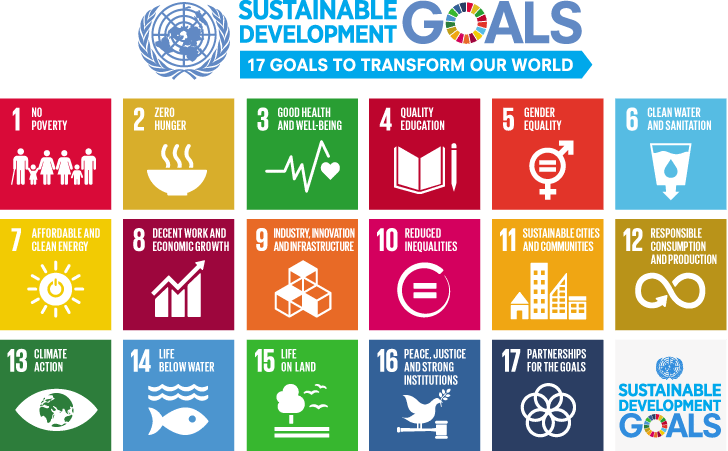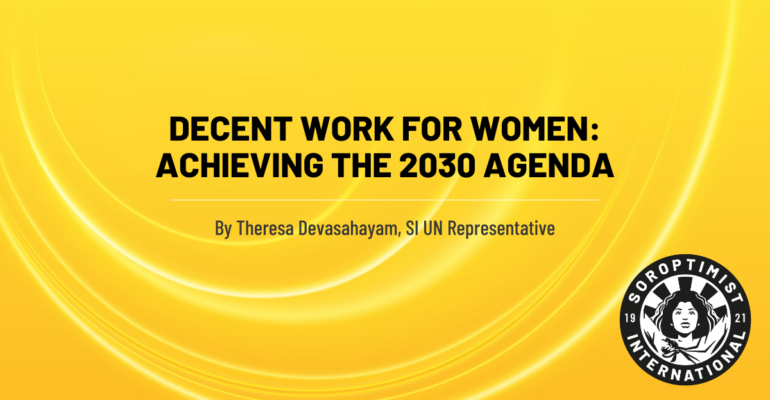Blog of Theresa Devasahayam, SI UN Representative in Bangkok.
As the world emerges out of the COVID-19 pandemic, the question of building sustainable economies is at the forefront of the agendas of countries worldwide. Soroptimist International had an online presence at the meeting “Accelerating Progress towards Decent Work and Fairer Societies” Bangkok, Thailand on 26 September 2023. The meeting, organised by UNU-WIDER in partnership with ESCAP, was focused on decent work as a path towards attaining the Sustainable Development Goals. The point about “fairness” emerged since inequalities continue to be prevalent within countries in the Asia Pacific although across countries, a positive trend of inequalities closing has been recorded.
Discussions at the meeting revolved around key ideas raised in the UNU-WIDER report entitled Towards Peace, Decent Work, and Greater Equality: Research Evidence for Transforming Economies, States, and Societies. That the world is at the halfway point towards the 2030 Agenda for Sustainable Development provided the impetus for the report to be published. Speakers at the meeting included Dr Kunal Sen, Director of UNU-WIDER; Hamza Ali Malik; Director of Economic Policy and Financing for Development Division, ESCAP; Mitsue Uemura, Regional Education Advisor, UNICEF; and Ken Chamuwa, Senior Economist and Head of Regional Economic and Social Analysis Unit, ILO.

The report highlighted the existing inequalities in the area of waged work in the Asia Pacific. Within countries in the region, women as a collective have been found to be a left-behind group. Because of the gender gap in education and literacy, women tend to cluster in jobs that pay poorly; therefore the gender pay gap remains to be significantly wide, particularly in selected developing countries. Additionally, in many countries, women continue to form the largest proportion among informal workers. As digitalisation picks up speed, women, in particular, are more likely to constitute the “left behind” group lacking the relevant skills. Thus there is a need for policies to be in place to ensure that women receive the right training to strengthen their competitiveness so as to assist them to stay on in the job market as well as to enable them to move into the formal work sector so that they are able to climb in the labour market.
The significance of social protections was a central theme discussed at the meeting. In the Asia Pacific, two-thirds of the working population are engaged in the informal sector, suggesting that they are most vulnerable since they lack social protections. In the region, around 64 percent of women workers are employed in the informal sector, as it is the case in the countries in South Asia and Southeast Asia. Women’s vulnerability is accentuated because they do not participate in the labour force equally, as in men, since they have to fulfill their unpaid care work role, placing a disproportionate burden on them. For the working poor, it was suggested that there is more reason for a push towards providing a living wage. Amongst the poorer developing countries, the question of how to finance social protections continues to be a challenge. That said, the solution might also lie in generating more formal sector jobs to absorb these women as a route out of poverty amongst them. In other words, social protections should be linked to jobs rather than constitute cash transfers since the latter can throw a country into debt, as suggested by one speaker.
As the world transitions towards low carbon energy as sustainable development becomes the underlying key force propelling economies, jobs should not just be decent but should be “green.” In fact this might be the one single dilemma in the next two decades: to provide skills so that countries, such as China and India – both of which are moving from being agricultural to manufacturing – will embrace the “green growth” development paradigm. On this, one speaker suggested that rather than manufacturing, governments should consider services as a focal point of economic growth: in this regard, “service [should be seen as] the new manufacturing.”
The creation of decent work entails developing skills. If fact there continues to be a need to invest in children through education. The outcomes are twofold: first, it serves to help individuals and, in turn, communities break out of poverty; and, second, educating a child means that he or she is better prepared to enter the formal work sector in adulthood. Governments should explore multiple learning pathways increasingly marked by the use of technological innovations.
Because of ageing populations, there is a need for socially inclusive economies. Keeping older persons in the labour force would complement social protection measures. To accommodate the needs and concerns of older workers, flexible work arrangements could be implemented although financial incentives may also be imperative: both should come hand in hand with lifelong training for older persons so that they have the opportunity to upskill themselves.
Beyond generating economic opportunities, the role of the state is crucial in the creation of social protection systems, urgently needed for the poor who might find it more difficult to break out of the cycle of poverty. In creating their own social protection systems, a suggestion was that governments in the Asia Pacific should look for best practices from the region to emulate.
Given that Soroptimist International has had a focus on education since its inception, it is fitting that the organisation encourages projects in the following areas: (a) digital education for girls comprising the use of digital tools and technologies; and (b) upskilling of older persons in the use of digital tools and technologies. For girls, this would prepare them for a digital future, whereas for older persons, including older women, receiving digital skills would empower them in the areas of employment, health and personal well-being. In a nutshell, these digital projects would educate, empower, and enable the women and girls we serve.

